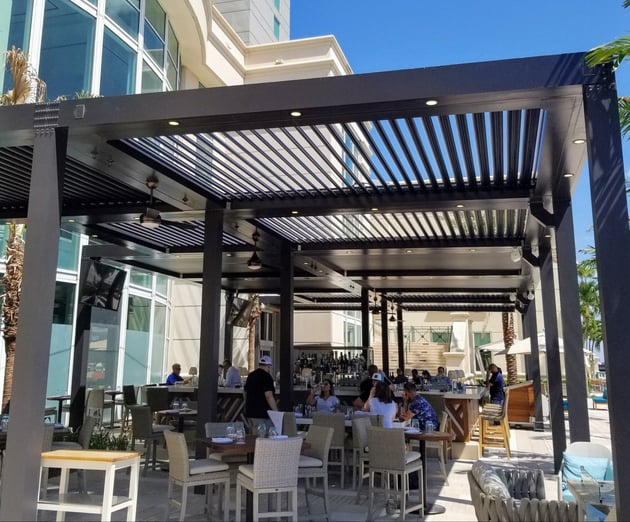Do Pergolas Hold Up in Florida's Hurricanes?
Pergolas are a popular addition to Florida backyards, and for good reason. They offer shade from the sun, style for your outdoor space, and a comfortable spot to relax or entertain. But in the Sunshine State, we also face one of the most active hurricane seasons in the country. So when summer rolls around, one question always comes up: Can it handle a hurricane?
The truth is, not all pergolas are built the same. Whether your structure can stand up to strong winds and heavy rain depends on a few key factors. Let’s break them down.
1. The Right Material Makes All the Difference
In Florida’s climate, a pergola is only as strong as the material it’s made from. To withstand the heat, humidity, and hurricane-force winds, it’s essential to choose the right material from the start.
Materials to Avoid:
- Wood: While visually appealing, wood is not ideal for Florida’s climate. It absorbs moisture, which leads to swelling and warping that weakens joints over time. These weakened areas are often the first to fail during storms. Wood also requires regular upkeep to prevent rot and termite damage, both common in humid conditions.
- Vinyl: Vinyl may seem like a low-maintenance choice, but it lacks the structural strength needed for hurricane-prone areas. Prolonged sun exposure can make it brittle, and it may crack or break when impacted by debris or exposed to sudden pressure changes during storms.
Aluminum: The Best Material for Florida Pergolas
Aluminum pergolas, on the other hand, are built with Florida’s weather in mind. They resist rust, maintain their shape without warping or rotting, and can be engineered to meet local wind ratings so you can feel confident your pergola is ready for hurricane conditions. Their high strength-to-weight ratio also means they stay durable without adding unnecessary bulk that could become hazardous in high winds.
That said, not all aluminum pergolas are built to the same standards. If you want true storm protection, it’s important to know what to look for.
When shopping for a storm-ready pergola, seek out structures made from high grade aircraft-quality aluminum that's specifically engineered for high-wind zones. These pergolas feature reinforced connections, thicker wall sections, and design elements that help wind flow around rather than against the structure.
The best hurricane-rated aluminum pergolas also include powder-coated finishes that resist corrosion and UV damage, ensuring your investment remains both functional and attractive for years to come.
2. Proper Installation Is Critical
Without a solid foundation and proper anchoring, even the most durable materials can fail in hurricane-force winds. That’s why expert installation is one of the most important steps in making your pergola hurricane-rated.
In Florida, that means more than simply securing it to the ground. It starts with reinforced footings that extend deep enough to resist both high winds and uplift. From there, the frame is anchored using hurricane-rated bolts and brackets that hold everything firmly in place.
Professional installers follow Florida’s strict local building codes to ensure every connection meets storm safety standards. They also account for site conditions like soil type and drainage, which help keep the foundation stable during heavy rain.
Cutting corners on installation can lead to serious problems, including shifting, loosening, or even total collapse. When done right, expert installation gives your pergola the strength to stand up to the storm and protects your investment for years to come.
3. Hurricane Ratings and Code Compliance Matter
Some pergolas may look durable, but that doesn’t mean they’re built to withstand a hurricane. In Florida, it's not enough for a pergola to appear sturdy, it needs to be rated, tested, and approved to meet specific wind load requirements.
A wind rating refers to the maximum sustained wind speed a structure can handle without failing. For Florida homes, that typically means ratings of 130 to 150 mph or more. These ratings are only valid when the pergola is designed to meet local building codes and installed according to manufacturer guidelines.
Code compliance involves more than solid construction. Most Florida counties require permits, engineering documentation, and inspections to ensure the structure meets safety standards for your wind zone.
Aluminum Co. offers custom StruXure aluminum pergolas engineered to meet Florida’s stringent hurricane codes. That means the products are manufactured and built with durability and storm safety in mind.
Your Pergola Can Weather the Storm
Pergolas can absolutely hold up in Florida hurricanes when they’re built with the right materials, installed by professionals, and designed to meet local wind load requirements. The key is choosing high-grade aluminum construction, proper installation, and full code compliance.
Hurricane season doesn’t have to stand in the way of enjoying your outdoor space. With the right approach, you can add comfort, style, and safety to your backyard with confidence.
Ready to explore pergola options designed for Florida’s toughest weather? Schedule a consultation with Aluminum Co. to discover hurricane-rated pergolas that deliver lasting durability and peace of mind.

.jpg?width=1280&name=getty-images-Cb-OEvj62NU-unsplash%20(1).jpg)


%2010_0000_Rob_Wolf_Arcadia_Mississauga%202.jpeg?width=630&name=20210612-South%20Calgary%20YSBD%20Collab%20%5BGreen%5D%20(9)%2010_0000_Rob_Wolf_Arcadia_Mississauga%202.jpeg)
